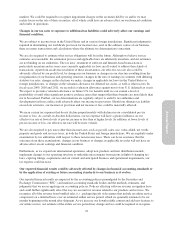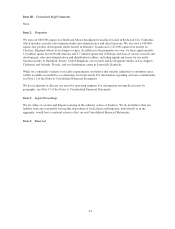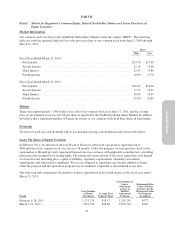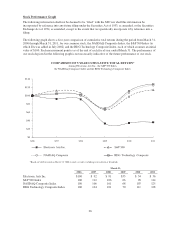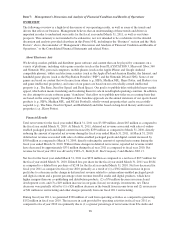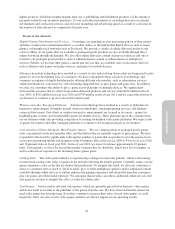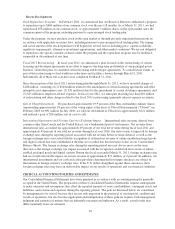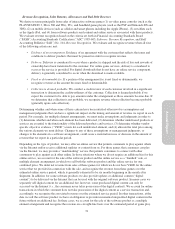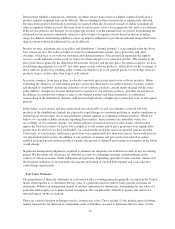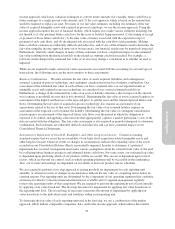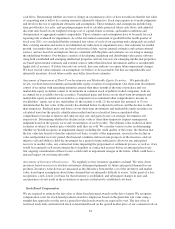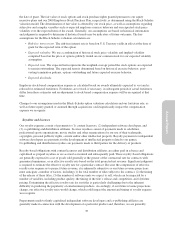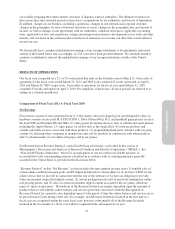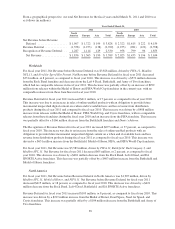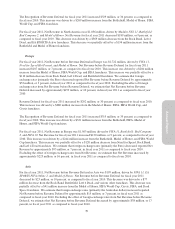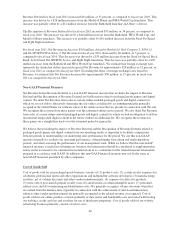Electronic Arts 2011 Annual Report Download - page 106
Download and view the complete annual report
Please find page 106 of the 2011 Electronic Arts annual report below. You can navigate through the pages in the report by either clicking on the pages listed below, or by using the keyword search tool below to find specific information within the annual report.
Recent Developments
Stock Repurchase Program. In February 2011, we announced that our Board of Directors authorized a program
to repurchase up to $600 million of our common stock over the next 18 months. As of March 31, 2011, we had
repurchased $58 million of our common stock, or approximately 3 million shares, in the open market since the
commencement of the program, including pursuant to a pre-arranged stock trading plan.
Under the program, we may purchase stock in the open market or through privately negotiated transactions in
accordance with applicable securities laws, including pursuant to pre-arranged stock trading plans. The timing
and actual amount of the stock repurchases will depend on several factors including price, capital availability,
regulatory requirements, alternative investment opportunities, and other market conditions. We are not obligated
to repurchase any specific number of shares under the program and the repurchase program may be modified,
suspended or discontinued at any time.
Fiscal 2011 Restructuring. In fiscal year 2011, we announced a plan focused on the restructuring of certain
licensing and developer agreements in an effort to improve the long-term profitability of our packaged goods
business. Under this plan, we amended certain licensing and developer agreements. To a much lesser extent, as
part of this restructuring we had workforce reductions and facilities closures through March 31, 2011.
Substantially all of these exit activities were completed by March 31, 2011.
Since the inception of the fiscal 2011 restructuring plan through March 31, 2011, we have incurred charges of
$148 million, consisting of (1) $104 million related to the amendment of certain licensing agreements and other
intangible asset impairment costs, (2) $31 million related to the amendment of certain developer agreements, and
(3) $13 million in employee-related expenses. In fiscal year 2012, we anticipate incurring less than $10 million
of restructuring and other charges related to the fiscal 2011 restructuring (primarily interest expense accretion).
Sale of Ubisoft Investment. We purchased approximately 19.9 percent of the then-outstanding ordinary shares
(representing approximately 18 percent of the voting rights at the time) of Ubisoft Entertainment (“Ubisoft”) in
February 2005 for $91 million. In July 2010, we sold our investment in Ubisoft for approximately $121 million
and realized a gain of $28 million, net of costs to sell.
International Operations and Foreign Currency Exchange Impact. International sales (revenue derived from
countries other than Canada and the United States), are a fundamental part of our business. Net revenue from
international sales accounted for approximately 49 percent of our total net revenue during fiscal year 2011 and
approximately 45 percent of our total net revenue during fiscal year 2010. Our net revenue is impacted by foreign
exchange rates during the reporting period associated with net revenue before revenue deferral, as well as the
foreign exchange rates associated with the recognition of deferred net revenue of online-enabled packaged goods
and digital content that were established at the time we recorded this deferred net revenue on our Consolidated
Balance Sheets. The foreign exchange rates during the reporting period may not always move in the same
direction as the foreign exchange rate impact associated with the recognition of deferred net revenue of online-
enabled packaged goods and digital content. During the fiscal year ended March 31, 2011, foreign exchange rates
had an overall unfavorable impact on our net revenue of approximately $71 million, or 2 percent. In addition, our
international investments and our cash and cash equivalents denominated in foreign currencies are subject to
fluctuations in foreign currency exchange rates. If the U.S. dollar strengthens against these currencies, then
foreign exchange rates may have an unfavorable impact on our results of operations and our financial condition.
CRITICAL ACCOUNTING POLICIES AND ESTIMATES
Our Consolidated Financial Statements have been prepared in accordance with accounting principles generally
accepted in the United States. The preparation of these Consolidated Financial Statements requires management
to make estimates and assumptions that affect the reported amounts of assets and liabilities, contingent assets and
liabilities, and revenue and expenses during the reporting periods. The policies discussed below are considered
by management to be critical because they are not only important to the portrayal of our financial condition and
results of operations, but also because application and interpretation of these policies requires both management
judgment and estimates of matters that are inherently uncertain and unknown. As a result, actual results may
differ materially from our estimates.
30



